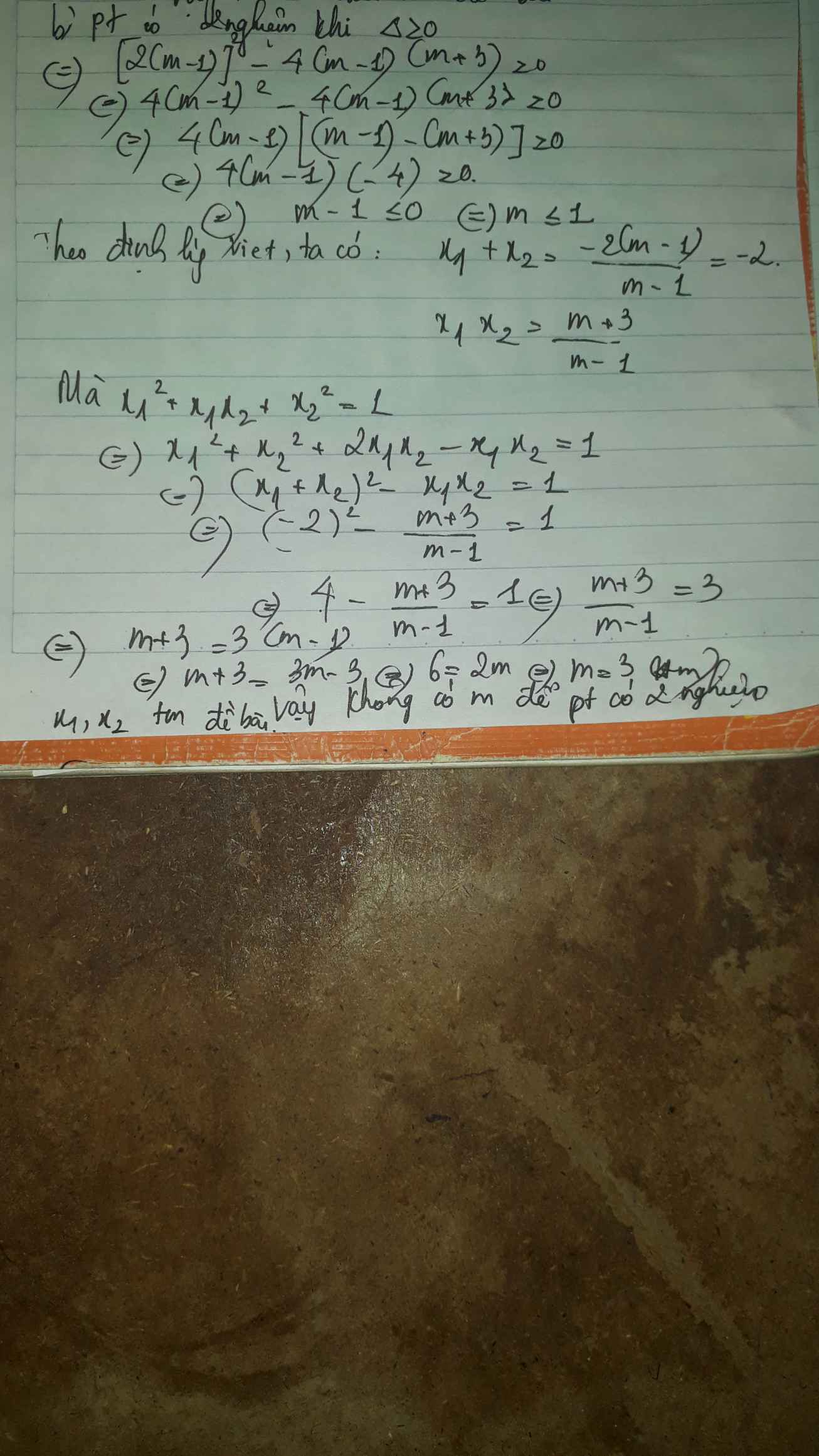Hãy nhập câu hỏi của bạn vào đây, nếu là tài khoản VIP, bạn sẽ được ưu tiên trả lời.

b) phương trình có 2 nghiệm \(\Leftrightarrow\Delta'\ge0\)
\(\Leftrightarrow\left(m-1\right)^2-\left(m-1\right)\left(m+3\right)\ge0\)
\(\Leftrightarrow m^2-2m+1-m^2-3m+m+3\ge0\)
\(\Leftrightarrow-4m+4\ge0\)
\(\Leftrightarrow m\le1\)
Ta có: \(x_1^2+x_1x_2+x_2^2=1\)
\(\Leftrightarrow\left(x_1+x_2\right)^2-2x_1x_2=1\)
Theo viet: \(\left\{{}\begin{matrix}x_1+x_2=-\dfrac{b}{a}=2\left(m-1\right)\\x_1x_2=\dfrac{c}{a}=m+3\end{matrix}\right.\)
\(\Leftrightarrow\left[-2\left(m-1\right)^2\right]-2\left(m+3\right)=1\)
\(\Leftrightarrow4m^2-8m+4-2m-6-1=0\)
\(\Leftrightarrow4m^2-10m-3=0\)
\(\Leftrightarrow\left[{}\begin{matrix}m_1=\dfrac{5+\sqrt{37}}{4}\left(ktm\right)\\m_2=\dfrac{5-\sqrt{37}}{4}\left(tm\right)\end{matrix}\right.\Rightarrow m=\dfrac{5-\sqrt{37}}{4}\)

Δ=(m+2)^2-4*2m=(m-2)^2
Để PT có hai nghiệm pb thì m-2<>0
=>m<>2
\(\dfrac{1}{x_1}+\dfrac{1}{x_2}=\dfrac{x_1x_2}{4}\)
=>\(\dfrac{x_1+x_2}{x_1x_2}=\dfrac{x_1x_2}{4}\)
=>\(\dfrac{m+2}{2m}=\dfrac{2m}{4}=\dfrac{m}{2}\)
=>2m^2=2m+4
=>m^2-m-2=0
=>m=2(loại) hoặc m=-1

\(\Delta=\left(-5\right)^2-4\left(m-1\right)\)
\(=25-4m+4\)
\(=29-4m\)
Để pt có 2 nghiệm thì \(\Delta>0\)
\(\Leftrightarrow m< \dfrac{29}{4}\)
Theo hệ thức Vi-ét, ta có: \(\left\{{}\begin{matrix}x_1+x_2=5\\x_1x_2=m-1\end{matrix}\right.\) (1)
\(2x_2=\sqrt{x_1}\) ; \(ĐK:x_1;x_2\ge0\)
\(\Leftrightarrow4x_2^2=\left|x_1\right|\)
\(\Leftrightarrow4x_2^2=x_1\) (2)
Thế \(x_1=4x^2_2\) vào \(\left(1\right)\), ta được:
\(\left\{{}\begin{matrix}4x_2^2+x_2-5=0\\4x_2^3-m+1=0\end{matrix}\right.\)
\(\Leftrightarrow\left\{{}\begin{matrix}\left[{}\begin{matrix}x_2=-\dfrac{5}{4}\left(ktm\right)\\x_2=1\left(tm\right)\end{matrix}\right.\\4.1^3-m+1=0\end{matrix}\right.\)
\(\Leftrightarrow\left\{{}\begin{matrix}x_2=1\\m=5\end{matrix}\right.\)
\(\left(2\right)\Rightarrow x_1=4\)
Vậy \(\left\{{}\begin{matrix}m=5\\x_1=4\\x_2=1\end{matrix}\right.\)

=>(x1-1)[x2^2-x2(x1+x2-1)+x1x2+1]=-3
=>(x1-1)[-x1x2+x2+x1x2+1]=-3
=>(x1-1)(x2+1)=-3
=>x1x2+(x1-x2)-1=-3
=>(x1-x2)=-3+1-x1x2=-2-m+5=-m+3
=>(x1+x2)^2-4x1x2=m^2-6m+9
=>4^2-4(m-5)=m^2-6m+9
=>4m-20=16-m^2+6m-9=-m^2+6m+7
=>4m-20+m^2-6m-7=0
=>m^2-2m-27=0
=>\(m=1\pm2\sqrt{7}\)

\(x^2-2\left(m+1\right)x+4m=0\)
\(\text{∆}=4\left(m+1\right)^2-16m=4\left(m-1\right)^2\)
để phương trình có 2 nghiệm phân biệt:
\(\Leftrightarrow\left(m-1\right)^2>0\Leftrightarrow m\ne1\)
\(\Rightarrow\left\{{}\begin{matrix}x_1=\dfrac{2\left(m+1\right)+2\left(m-1\right)}{2}=2m\\x_2=\dfrac{2\left(m+1\right)-2\left(m-1\right)}{2}=2\end{matrix}\right.\)
Ta có:
\(x_1=-3x_2\)
\(\Rightarrow2m=-6\Rightarrow m=-3\left(TM\right)\)
Vậy ...

\(x^2-\left(m+1\right)x+m+4=0\left(1\right)\)
\(\Rightarrow\Delta>0\Leftrightarrow\left(m+1\right)^2-4\left(m+4\right)>0\Leftrightarrow\left[{}\begin{matrix}m< -3\\m>5\end{matrix}\right.\)\(\left(2\right)\)
\(ddkt-thỏa:\sqrt{x1}+\sqrt{x2}=2\sqrt{3}\)
\(x1=0\Rightarrow\left(1\right)\Leftrightarrow m=-4\Rightarrow\left(1\right)\Leftrightarrow x^2+3x=0\Leftrightarrow\left[{}\begin{matrix}x1=0\\x2=-3< 0\left(loại\right)\end{matrix}\right.\)
\(x1\ne0\) \(\Rightarrow0< x1< x2\)
\(\Leftrightarrow\left\{{}\begin{matrix}x1+x2>0\\x1x2>0\end{matrix}\right.\Leftrightarrow\left\{{}\begin{matrix}m+1>0\\m+4>0\end{matrix}\right.\)\(\Rightarrow m>-1\)\(\left(3\right)\)
\(\left(2\right)\left(3\right)\Rightarrow m>5\)
\(\Rightarrow\sqrt{x1}+\sqrt{x2}=2\sqrt{3}\)
\(\Leftrightarrow x1+x2+2\sqrt{x1x2}=12\Leftrightarrow m+1+2\sqrt{m+4}=12\)
\(\Leftrightarrow m+4+2\sqrt{m+4}-15=0\)
\(đặt:\sqrt{m+4}=t>5\Rightarrow t^2+2t-15=0\Leftrightarrow\left[{}\begin{matrix}t=-5\left(ktm\right)\\t=3\left(ktm\right)\end{matrix}\right.\)
\(\Rightarrow m\in\phi\)
Để pt có 2 nghiệm pb
\(\left(m+1\right)^2-4\left(m+4\right)=m^2+2m+1-4m-16\)
\(=m^2-2m-15>0\)
Theo Vi et \(\left\{{}\begin{matrix}x_1+x_2=m+1\\x_1x_2=m+4\end{matrix}\right.\)
Ta có : \(\left(\sqrt{x_1}+\sqrt{x_2}\right)^2=12\Leftrightarrow x_1+2\sqrt{x_1x_2}+x_2=12\)
Thay vào ta được \(m+1+2\sqrt{m+4}=12\Leftrightarrow2\sqrt{m+4}=11-m\)đk : m >= -4
\(\Leftrightarrow4\left(m+4\right)=121-22m+m^2\Leftrightarrow m^2-26m+105=0\)
\(\Leftrightarrow m=21\left(ktm\right);m=5\left(ktm\right)\)

b: x1=3x2 và x1+x2=2m-2
=>3x2+x2=2m-2 và x1=3x2
=>x2=0,5m-0,5 và x1=1,5m-1,5
x1*x2=-2m
=>-2m=(0,5m-0,5)(1,5m-1,5)
=>-2m=0,75(m^2-2m+1)
=>0,75m^2-1,5m+0,75+2m=0
=>\(m\in\varnothing\)
c: x1/x2=3
x1+x2=2m-2
=>x1=3x2 và x1+x2=2m-2
Cái này tương tự câu b nên kết quả vẫn là ko có m thỏa mãn

\(\Delta'=9-m-3=6-m>0\Rightarrow m< 6\)
Theo hệ thức Viet: \(x_1+x_2=6\Rightarrow\dfrac{x_1+x_2}{2}=3\)
\(\Rightarrow\) Luôn tồn tại ít nhất 1 trong 2 giá trị \(x_1;x_2\) không nhỏ hơn 3
Nếu \(x_2\ge3\Rightarrow\left|x_1-1\right|+3x_2\ge3x_2\ge9\)
Dấu "=" xảy ra khi và chỉ khi \(\left\{{}\begin{matrix}x_1-1=0\\x_2=3\end{matrix}\right.\) \(\Rightarrow x_1+x_2=4\) (ktm)
\(\Rightarrow x_2< 3\) và \(x_1\ge3\Rightarrow\left|x_1-1\right|=x_1-1\)
Do đó:
\(x_1-1+3x_2=9\Rightarrow x_1=10-3x_2\)
Thế vào \(x_1+x_2=6\Rightarrow10-2x_2=6\Rightarrow x_2=2\Rightarrow x_1=4\)
\(x_1x_2=m+3\Rightarrow m+3=8\Rightarrow m=5\)